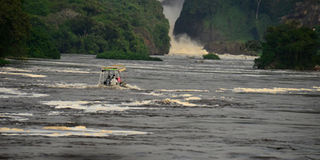Government tasked to develop policy on River Nile water use

Economic activity. Murchison Falls where the River Nile surges through a narrow gap forcing a massive water fall. River Nile is habitat to buffaloes, hippos, Nile crocodiles and aquatic birds among others.
What you need to know:
- Shortcoming. Engineers note that Uganda is not effectively utilising the river due to lack of a properly defined interest.
Kampala. The Annual Engineers Forum closed at the weekend with a call for government to develop a policy on how the River Nile water can be sustainably and optimally utilised.
The engineers noted that Uganda has no policy regarding harnessing and the use of the water, unlike Nile Basin countries such as Egypt, Sudan and Ethiopia.
“What is Uganda’s national interest in the River Nile? Even our Constitution does not talk about it except in passing,” Mr Julius Onen, the Permanent Secretary in the Ministry of Trade, said.
With an estimated length of almost 6,853km, the Nile is regarded as the longest river in the world. Its drainage basin covers 11 countries.
The Minister of Energy, Ms Irene Muloni, said government will take up the resolutions.
Ms Muloni also said River Nile should be used equitably and responsibly because all the Nile Basin countries have a stake on the God-given water resource equally depend on it.
The Minister of Works, Ms Monica Azuba Ntege, said there are several development activities/initiatives currently being implemented on the Nile River that have direct bearings on all the communities.
She called for sustainable exploitation of resources from the river without heightening tensions among other countires. Ms Azuba said construction of hydropower stations, setting up of irrigation schemes, water navigation and oil explorations on the river are some of the activities that require well thought out approaches which cannot be dettached from the engineers’ perspectives.
Challenges
Attempts to establish agreements between the countries sharing the Nile water has been made although it has been difficult to have all them agree.
In May 2010, Uganda, Ethiopia, Rwanda and Tanzania signed a new agreement on sharing the Nile amid ppposition from Egypt and Sudan.
“For equitable and efficient usage of the Nile basin’s water resources Uganda, must cooperate with all the partner states,” Mr Charles Wana – Etyem, an engineer, said.
“Nile water is not ours alone. And importantly, we are occupying both up and downstream segment of the Nile. This means that whatever happens elsewhere in the River Nile will affect us. This is why it is should be in our interest to collaborate with all other Nile Basin countries,” he added.


